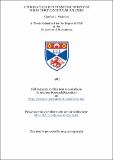A three-colour photometric survey of Virgo 'core' lenticular galaxies
Abstract
Photographic Surface photometry in the Johnson B, R and I passbands of eighteen galaxies within 3° of the Virgo cluster 'core' is presented in this work. U.K. National facilities and STARLIKK common-user software were used to produce major and minor-axis luminosity profiles, colour-difference profiles, isophotal maps, equivalent profiles, and standard luminosity parameters for each galaxy in each passband. Standard techniques have been applied to the equivalent profiles to produce decomposed bulge and disk components for each galaxy. Solutions which are demonstrated to be realistic representations of the programme galaxies are amalgamated with previously-published independent data to construct homogeneous data sets. Nearly all the lenticular systems surveyed display vestigial disk structure or unusual features in the colour-difference profiles. Statistical analysis of the constructed data sets reveals no significant structural differences in the bulge components of disk systems as a function of morphological type, in contradiction with the earlier results of Dressier (1980). Significant differences in the disk components as a function of morphological type are found in the B-band data, but not the I-band data, in agreement with the results of Hamabe (1982) and Boroson et al. (1983b) respectively. The primary objections to the production of lenticular galaxies from spiral progenitors appear to have been discredited, together with several intrinsic-formation theories, and the results presented in this survey are considered strongly supportive of the hypothesis of a common origin of disk systems of all morphological types. The conclusion that at least some fraction of lenticular systems must have looked like spiral galaxies at some time in their history seems almost inescapable.
Type
Thesis, PhD Doctor of Philosophy
Collections
Items in the St Andrews Research Repository are protected by copyright, with all rights reserved, unless otherwise indicated.

